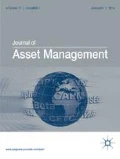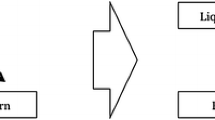Abstract
In this article, we examine a broad sample of socially responsible (SR) and conventional mutual funds with respect to financial and ethical parameters. We cannot document profound differences in their financial performance. With regard to ethical performance, we indeed find that an investor who seeks to avoid the least ethical of all available funds can do so by purchasing SR mutual funds. Still, we also demonstrate that SR mutual funds are not holding considerably more ethical assets on average. Moreover, the label ‘SR mutual fund’ does not in any way guarantee the exclusion of clearly unethical firms, which contrasts to the common perception of screening out poor assets.

Similar content being viewed by others
References
Bauer, R., Koedijk, K. and Otten, R. (2005) International evidence on ethical mutual fund performance and investment style. Journal of Banking and Finance 29 (7): 1761–1767.
Brammer, S., Brooks, C. and Pavelin, S. (2006) Corporate social performance and stock returns: UK evidence from disaggregate measures. Financial Management 35 (3): 97–116.
Capelle-Blancard, G. and Monjon, S. (2012) Trends in the literature on socially responsible investment: Looking for the keys under the lamppost. Business Ethics: A European Review 21 (3): 239–250.
Carhart, M. (1997) On persistence in mutual fund performance. Journal of Finance 52 (1): 57–82.
Derwall, J., Guenster, N., Bauer, R. and Koedijk, K. (2005) The eco-efficiency premium puzzle. Financial Analysts Journal 61 (2): 51–63.
Derwall, J., Koedijk, K. and Horst, J.T. (2011) A tale of values-driven and profit-seeking social investors. Journal of Banking and Finance 35 (8): 2137–2147.
Dorfleitner, G., Leidl, M. and Reeder, J. (2012) Theory of social returns in portfolio choice with application to microfinance. Journal of Asset Management 13 (6): 384–400.
Edmans, A. (2011) Does the stock market fully value intangibles? Employee satisfaction and equity prices. Journal of Financial Economics 101 (3): 621–640.
Gruber, M.J. (1996) Another puzzle: The growth in actively managed mutual funds. Journal of Finance 51 (3): 783–810.
GSIA (2013) Global sustainable investment review 2012.
Guerard, J.B. (1997) Additional evidence on the cost of being socially responsible in investing. Journal of Investing 6 (4): 31–36.
Hamilton, S., Jo, H. and Statman, M. (1993) Doing well while doing good? The investment performance of socially responsible mutual funds. Financial Analysts Journal 49 (6): 62–66.
Hong, H. and Kacperczyk, M. (2009) The price of sin: The effect of social norms on markets. Journal of Financial Economics 93 (1): 15–36.
Jensen, M.C. (1968) The performance of mutual funds in the period 1945–1964. Journal of Finance 23 (2): 389–416.
Kempf, A. and Osthoff, P. (2008) SRI funds: Nomen est omen. Journal of Business Finance & Accounting 35 (9–10): 1276–1294.
Kurtz, L. and DiBartolomeo, D. (1996) Socially screened portfolios: An attribution analysis of relative performance. Journal of Investing 5 (3): 35–41.
Luck, C. and Pilotte, N. (1993) Domini social index performance. Journal of Investing 2 (3): 60–62.
Mănescu, C. (2011) Stock returns in relation to environmental, social and governance performance: Mispricing or compensation for risk? Sustainable Development 19 (2): 95–118.
Margolis, J.D., Elfenbein, H.A. and Walsh, J.P. (2009) Does it pay to be good... and does it matter? A meta-analysis of the relationship between corporate social and financial performance. http://ssrn.com/abstract=1866371.
Modigliani, F. and Modigliani, L. (1997) Risk-adjusted performance. How to measure it and why. Journal of Portfolio Management 23 (2): 45–54.
Moskowitz, M. (1972) Choosing socially responsible stocks. Business and Society Review 1 (1): 71–75.
Renneboog, L., ter Horst, J. and Zhang, C. (2008a) The price of ethics and stakeholder governance: The performance of socially responsible mutual funds. Journal of Corporate Finance 14 (3): 302–322.
Renneboog, L., ter Horst, J. and Zhang, C. (2008b) Socially responsible investments: Institutional aspects, performance, and investor behavior. Journal of Banking and Finance 32 (9): 1723–1742.
Schröder, M. (2007) Is there a difference? The performance characteristics of SRI equity indices. Journal of Business Finance and Accounting 34 (1-2): 331–348.
Sharpe, W.F. (1994) The Sharpe ratio. Journal of Portfolio Management 21 (4): 49–58.
Statman, M. and Glushkov, D. (2008) The wages of social responsibility. Financial Analysts Journal 65 (4): 33–46.
Treynor, J.L. (1965) How to rate management of investment funds. Harvard Business Review 43 (January–February): 63–75.
US SIF (2012) Report on sustainable and responsible investing trends in the United States 2012.
US SIF (2013) Sustainable & responsible mutual fund chart. http://charts.ussif.org/mfpc/, accessed 20 February 2013.
Utz, S., Wimmer, M., Hirschberger, M. and Steuer, R.E. (2014) Tri-criterion inverse portfolio optimization with application to socially responsible mutual funds. European Journal of Operational Research 234 (2): 491–498.
Wermers, R. (2000) Mutual fund performance: An empirical decomposition into stock-picking talent, style, transactions costs, and expenses. Journal of Finance 55 (4): 1655–1703.
Wilcoxon, F. (1945) Individual comparison by ranking methods. Biometrics Bulletin 1 (6): 80–83.
Author information
Authors and Affiliations
Corresponding author
Rights and permissions
About this article
Cite this article
Utz, S., Wimmer, M. Are they any good at all? A financial and ethical analysis of socially responsible mutual funds. J Asset Manag 15, 72–82 (2014). https://doi.org/10.1057/jam.2014.8
Received:
Revised:
Published:
Issue Date:
DOI: https://doi.org/10.1057/jam.2014.8




